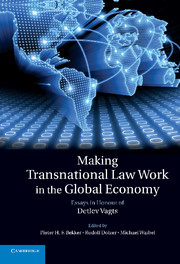Book contents
- Frontmatter
- Contents
- List of contributors
- Foreword: the transnationalism of Detlev Vagts
- List of cases cited
- List of abbreviations and acronyms
- Introduction: a Festschrift to celebrate Detlev Vagts' contributions to transnational law
- 1 Detlev Vagts and the Harvard Law School
- 2 Constructing and developing transnational law: the contribution of Detlev Vagts
- I International law in general
- II Transnational economic law
- 14 Sovereignty-plus in the era of interdependence: toward an international convention on combating human rights violations by Transnational Corporations
- 15 The noisy secrecy: Swiss banking law in international dispute
- 16 Not-for-profit organisations, conflicts of laws and the right of establishment under the EC Treaty
- 17 The meaning of ‘investment’ in the ICSID Convention
- 18 Toward a proper perspective of the private company's distinctiveness
- 19 Administrative law and international law: the encounter of an odd couple
- 20 Making transnational law work through regime-building: the case of international investment law
- 21 Creditor protection in international law
- 22 Stability, integration and political modalities: some American reflections on the European project after the financial crisis
- III Transnational lawyering and dispute resolution
- Bibliography of Detlev Vagts
- Index
14 - Sovereignty-plus in the era of interdependence: toward an international convention on combating human rights violations by Transnational Corporations
from II - Transnational economic law
Published online by Cambridge University Press: 17 November 2010
- Frontmatter
- Contents
- List of contributors
- Foreword: the transnationalism of Detlev Vagts
- List of cases cited
- List of abbreviations and acronyms
- Introduction: a Festschrift to celebrate Detlev Vagts' contributions to transnational law
- 1 Detlev Vagts and the Harvard Law School
- 2 Constructing and developing transnational law: the contribution of Detlev Vagts
- I International law in general
- II Transnational economic law
- 14 Sovereignty-plus in the era of interdependence: toward an international convention on combating human rights violations by Transnational Corporations
- 15 The noisy secrecy: Swiss banking law in international dispute
- 16 Not-for-profit organisations, conflicts of laws and the right of establishment under the EC Treaty
- 17 The meaning of ‘investment’ in the ICSID Convention
- 18 Toward a proper perspective of the private company's distinctiveness
- 19 Administrative law and international law: the encounter of an odd couple
- 20 Making transnational law work through regime-building: the case of international investment law
- 21 Creditor protection in international law
- 22 Stability, integration and political modalities: some American reflections on the European project after the financial crisis
- III Transnational lawyering and dispute resolution
- Bibliography of Detlev Vagts
- Index
Summary
Introduction
Communications today are faster and less expensive than before. Barriers to the movement of capital, goods and services are fewer. The tastes of consumers have become largely homogenous, shaped by the same advertising practices. As a result, the sphere of activity of most corporations typically reaches beyond national borders. They source their supplies from abroad, and they serve clients overseas. They invest and establish subsidiaries outside their State of origin. Sometimes, they are directly present abroad, by creating an agency in another State. The wedge increases between the jurisdiction of the State, which is primarily territorial, and the activity of the corporation, which is increasingly without borders.
In this context, State sovereignty must redefine itself. The assertion by each State of its exclusive competence to regulate activities on its national territory will result in a situation in which States compete with one another to attract companies, whether as buyers or as investors. As buyers of goods, companies act as gatekeepers to global markets: for developing countries' producers, they guarantee access to the high-value markets of industrialised nations, whose purchasing power is many times more significant than that of consumers in developing countries; or they may have unique processing capabilities, allowing raw commodities to be transformed for sale to the final consumer. As investors, companies bring in much-needed capital. Their presence can be a source of local employment opportunities. It can lead to transfers of technologies and know-how to local entrepreneurs.
- Type
- Chapter
- Information
- Making Transnational Law Work in the Global EconomyEssays in Honour of Detlev Vagts, pp. 245 - 284Publisher: Cambridge University PressPrint publication year: 2010
- 3
- Cited by

